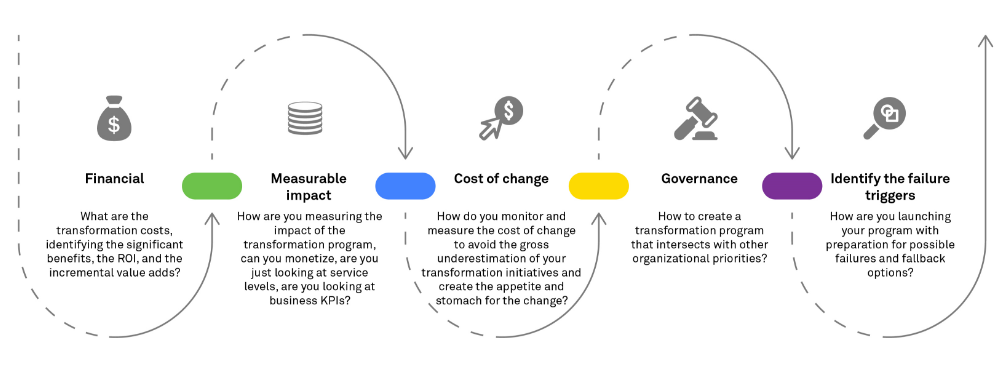Transformation is one of the most commonly used phrases, whether in the F&A space or while referring to technology, services, or organizations. Several key components, like people, process, technology, data, infrastructure, and stakeholders, enable a digital transformation.
At Wipro, we have taken a clear approach in designing transformation programs for our clients. Stakeholder experience takes precedence, followed by the process and then technology later. The key to a successful transformation is taking a business-first approach.
What are the three critical dimensions of transformation?
An efficacious transformation approach will have three buckets of priorities. First, it’s about building foundational capabilities. Assess how you can decouple the legacy processes, systems, and architecture that are limiting the foundational aspect of operations. After that, evaluate taking advantage of technology, best-of-breed processes, and business metrics to drive scale, repeatability, and efficiencies.
Second, deciding how to drive value in your operations. Transformation is all about generating value in core operations, and leveraging agility straight through the process with the help of solutions like automation, RPA, and bots. Driving contextual interactions and proactive decision-making while ensuring cross-boundary collaboration will further reign in the value of this strategy.
Third, exploring new frontiers with some out-of-the-box thinking while re-examining the value in operations or services. Unlock the value from new sectors and re-assess how the stakeholder journey evolves. Ascertain how your value chain can be realigned as one integrated value chain so that the transformation moves from service-level metrics to business-level metrics.
The COVID-19 pandemic left many a lesson in its aftermath. Even as it slowly reaches endemicity, the challenges are far from over. We learned that the ‘new normal’ really implied turning all business functions on their heads, and data integrity is ever more critical. Technology has become a key enabler in driving the growing work-from-home or hybrid work models, with data transparency and risk management at the core of this transition.
How do organizations build the stomach for change?
Many of us will acknowledge that COVID-19 has one of the biggest catalysts for digital transformation. The rise in e-commerce is a classic example with unprecedented volumes and adoption rates. Across industries, the pandemic had a lasting impact. Growth was severely stunted for the travel and hospitality industry, while the pharmaceutical segment saw tremendous expansion. Either way, both sectors need transformation with a change in the operating model. One can expect this pace of change to continue in the next few years. The question is – how do organizations prepare for this change? Do they have the appetite for this change?
To drive this digital and business transformation, the organization should have adequate bandwidth to implement, adopt and drive the pace of this change across business functions, be it supply chain, F&A, go-to-market initiatives, or customer experience.
Digital transformation is not just about investing in financial terms. There needs to be an all-around investment; a cultural change must go hand-in-hand, driven from top-down and bottom-up. There are several options for rapid prototyping - test it, run it and then roll out at scale, or roll back and move on. Leverage the power of technologies like artificial intelligence (AI) to enable crowdsourcing, a faster and cheaper approach.
How do we build the business case for transformation?
For any CFO or CPO, the business case for transformation must answer some critical questions across five key dimensions:

Industry :

Krishna Nacha
Senior Vice President
Krishna heads S.E.T (Shared Services, Enterprise Services, Transformation Services) globally for Wipro. He has 28 years of experience with a proven track record of formulating, solutioning, and scaling up shared services models for large global organizations. Krishna spearheads a 15,000+ operations team spread across 30+ centers and 11 countries and has been at the forefront of creating and ramping organic revenue growth and margin expansion models to drive the transformation strategy leveraging intelligent automation, analytics, digital, and BPaaS.
Krishna holds a Master’s degree in Business Administration from XLRI Jamshedpur, India, and a Bachelor of Engineering degree from NIT Karnataka, India.